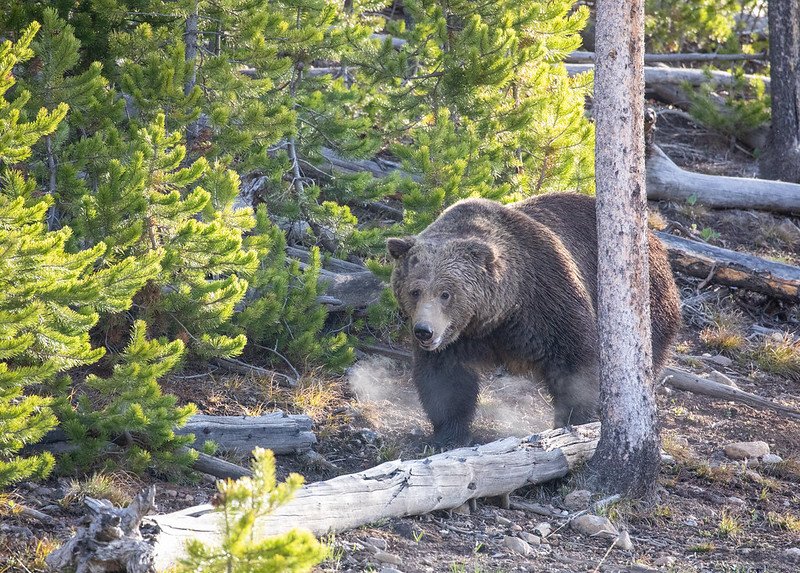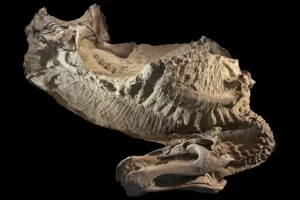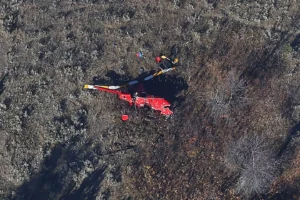In Bid to Speed Up Grizzly Delisting Process, Wyoming Goes to Court
State wants judge to force federal wildlife managers to make a decision
- Published In: Other News & Features
- Last Updated: May 26, 2023

The grizzly bear population in and around Yellowstone National Park has rebounded in recent decades, and the State of Wyoming contends it’s time to remove them from the list of threatened species. (Courtesy photo from Jim Peaco, National Park Service)
By CJ Baker
Special to the Wyoming Truth
This story has been updated to incorporate comments from Randall Luthi as of 5 p.m. Mountain on May 26, 2023.
For well over a year, the U.S. Fish and Wildlife Service has been mulling over a petition from the State of Wyoming that seeks to remove the region’s grizzly bears from the list of threatened species and turn the bears’ management over to the state. Gov. Mark Gordon is now asking a federal judge to expedite the process and order the agency to make a decision.

On Wednesday, the state sued the leaders of the Fish and Wildlife Service and the U.S. Department of the Interior, arguing that federal law required them to make a final determination months ago. The delay amounts to “unlawfully withholding a final agency action,” according to the state’s petition in U.S. District Court.
“Wyoming remains steady in its efforts to have the grizzly bear returned to state management,” Gordon’s chief energy adviser, Randall Luthi, said in a statement to the Wyoming Truth late Friday. “He called the court action “the logical next step in reaching that goal.”
Luthi said the grizzly population goals in the Greater Yellowstone Ecosystem “have not only been met but exceeded for many years,” while the state “has spent millions of dollars to support the federal management of bears.”
“It is appropriate and timely for that to change,” he said.
The Biden administration may agree: Responding to a January 2022 petition from the state, the Fish and Wildlife Service found that delisting the bear might be warranted and opened a 12-month review period. The service also granted further review of a petition from the State of Montana to delist grizzlies in the Northern Continental Divide Ecosystem, while rejecting one from Idaho that argued grizzlies in the lower-48 states are not a valid “species.”
Gordon welcomed the service’s initial finding as a “positive step,” but he wants the agency to move faster. His administration served the agency with a notice of intent to sue in March, noting U.S. Code only allows 12 months to decide whether a petition to list or delist a species is warranted.
“… the Service has no discretion to delay action beyond the deadline,” Attorney General Bridget Hill and Special Assistant Attorney General Jay Jerde wrote, noting the deadline passed on Jan. 21.
In an early May response, Fish and Wildlife didn’t address its delay, but invited the state to submit information and data during the review period. A service official also expressed appreciation for “Wyoming’s ongoing commitment to grizzly bear recovery.”

Thanks to decades of conservation efforts, the number of grizzlies in the region has rebounded from 136 bears in 1975 to nearly 1,000 last year in just their core habitat. Speaking before the Senate Committee on Environment and Public Works this month, Fish and Wildlife Service Director Martha Williams called the recovery “one of the success stories.”
Williams said her agency is “diligently” reviewing Wyoming’s and Montana’s petitions, but indicated she didn’t want to rush the process. She stressed a need to follow the science and act with care so the service’s decision is “durable.”
Two prior attempts to delist the species were challenged by environmental groups, tribes and others. The rules were ultimately voided by federal judges in 2009 and 2018, after they found flaws in the service’s approach.
“What I don’t want to see, [what] I don’t think any of us want to see, is flip-flops or delays from litigation,” Williams said. “I want to get the rules just right.”
A new attempt at delisting appears certain to face legal challenges. Numerous wildlife advocates oppose the idea — and particularly Wyoming’s, Montana’s and Idaho’s plans to reduce the grizzly population through hunting. Defenders of Wildlife CEO and former Fish and Wildlife Director Jamie Rappaport Clark has said delisting is “premature” and the Conservatives for Responsible Stewardship recently likened Montana’s and Wyoming’s plans to “a green light for the same type of wholesale slaughter that necessitated the species being listed in the first place.”
But backers of Wyoming’s plan — which would target perhaps three dozen bears in its first year — say the hunting limits would be conservative and a normal aspect of managing wildlife. They also contend that delisting is overdue.
“The grizzly’s been recovered for 20 years — 20 years — and yet it’s still on the list,” U.S. Sen. Cynthia Lummis (R-Wyo.) said at this month’s hearing. “And to me that sort of negates the whole purpose of the Endangered Species Act.”
Noting that the Fish and Wildlife Service was four months past the deadline for making a final decision on Wyoming’s petition, the senator urged Williams to “act with vigor.” Gordon and the attorney general’s office are now hoping that U.S. District Court Judge Alan Johnson will issue a similar edict to the service through the litigation.
Federal officials will file a response to Wyoming’s suit in the coming weeks.













